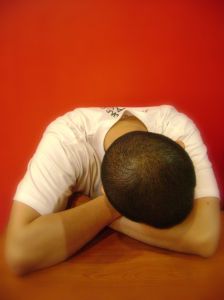Mild Insomnia? 5 Tips for Getting a Good Night’s Sleep.
Guidelines for Better Sleep
 Sleeping well is a habit that you can learn! Small changes can have big effects. Start today by following these rules:
Sleeping well is a habit that you can learn! Small changes can have big effects. Start today by following these rules:
Take care of your body
• Do not drink caffeine: no tea, coffee, or coca-cola after 4 o’clock
• Do not eat a big or spicy meal late in the evening
• Do not go to bed hungry
• Avoid alcohol as it interferes with sleep
Physical exercise, such as a brisk walk, in the late afternoon can help to make your body tired and help you to sleep. Try to do some exercise each day.
Sleep only at night-time and do not have day-time naps, no matter how tired you feel. Naps only keep the problem going by making it harder for you to get to sleep the next night.
Having a regular bedtime routine teaches your body when it’s time to go to sleep.
• Go to bed at same time each night
• Try to get up at the same time every day, even if this is tiring to begin with
• Have a soothing drink like camomile tea or a milky drink
• Have a bath, or a routine of washing your face and brushing your teeth
• When in bed think of nice things (e.g. think of 5 nice things that happened that day – they might be big or small, such as a nice conversation, seeing the sunshine, or hearing nice music on the radio)
• Do a relaxed breathing exercise (e.g. breathe in for a count of four, hold it for a count of two, then breathe out for a count of six)
Coping with bad dreams can be difficult. Some people don’t like relaxation before going to sleep, or are scared of letting go. If that is you, try these preparation techniques instead:
• Prepare yourself in case you have bad dreams by thinking of a bad dream then think of a different ending for it. Practice this new ending many times before going to sleep.
• Before going to sleep prepare to re-orient yourself when you wake from a bad dream.
• Put a damp towel or a bowl of water by the bed to splash your face, place a special object by the bed, such as a photograph, or a small soft toy.
• When you wake up from a bad dream- move your body if you can and reorient yourself immediately (touching object, wetting face, going to the window, talk to yourself in a reassuring way)
Make your bedroom a pleasant place to be
* Get a nightlight
* Keep it clean and tidy
* Introduce pleasant smells such as a drop of lavender oil onto the pillow
* Get extra pillows
* Make sure that your home is safe e.g. doors locked, windows closed.
REMEMBER: Bed is for sleeping, so if you cannot sleep after 30 minutes, get up and do another activity elsewhere such as reading or listening to music (try and avoid TV as it can wake you up). After 15 minutes return to bed and try to sleep again. If you still can’t sleep
after 30 minutes get up again. Repeat this routine as many times as necessary and only use your bed for sleeping in.
*Reprinted from Psychology Tools


















